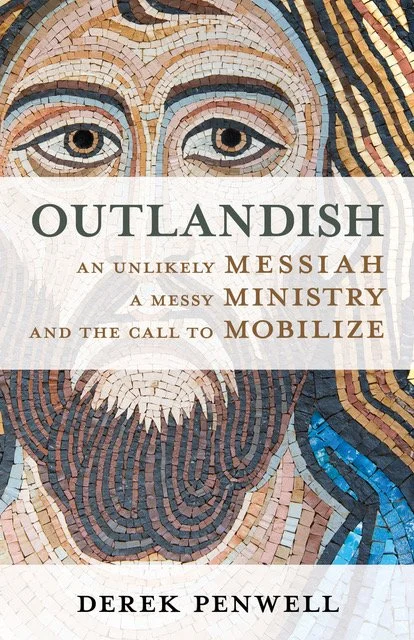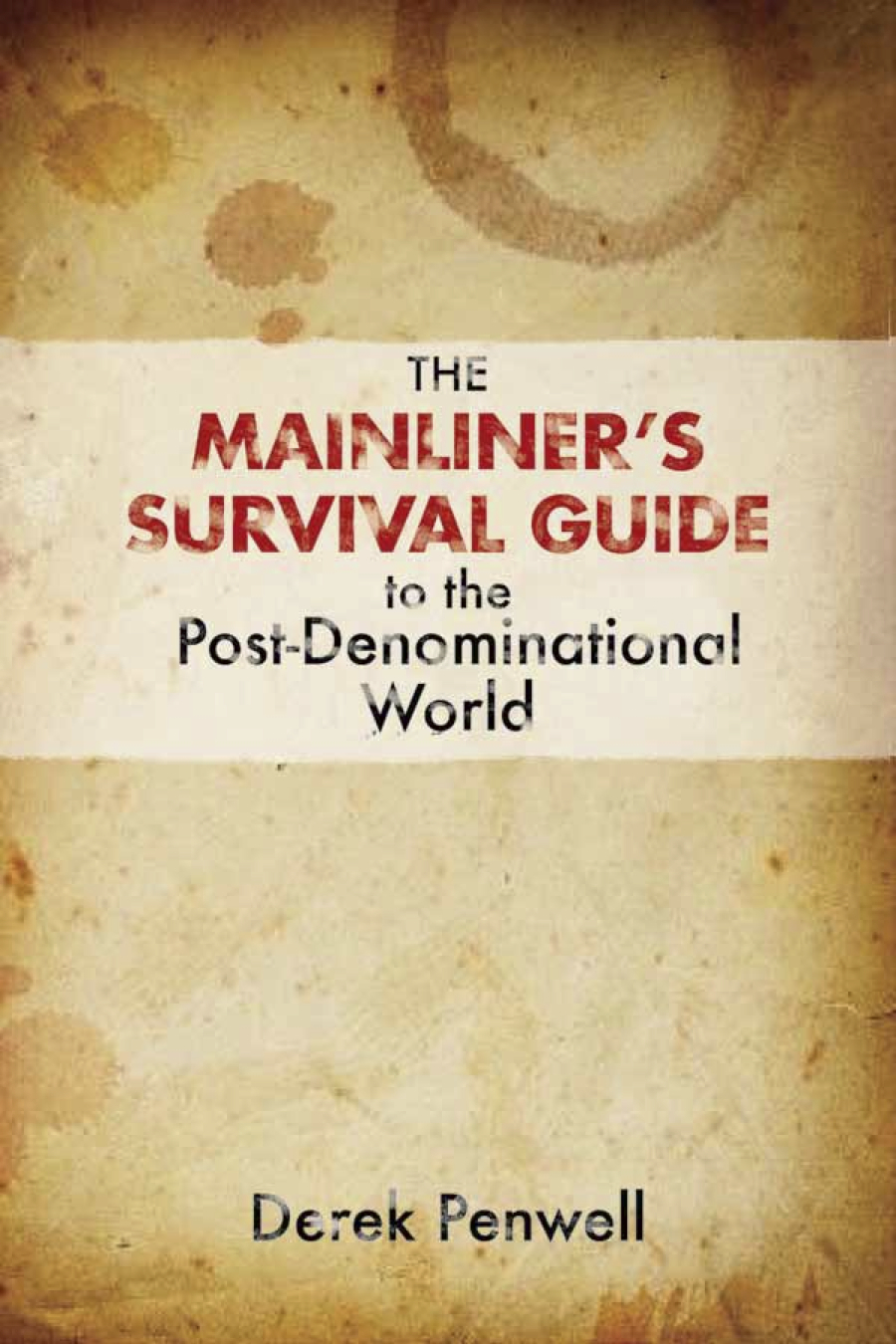Author Portfolio
Derek Penwell: Author, Activist, Speaker, and Theologian
Derek Penwell is a respected figure in the realms of theology, social justice, and political advocacy, serving as a senior minister in the Christian Church (Disciples of Christ). His career is marked by a deep commitment to embodying the progressive spirit of Jesus, which informs his roles as an author, speaker, and activist.
Publications and Media Presence: Derek's literary contributions include notable works such as "Outlandish: An Unlikely Messiah, a Messy Ministry, and the Call to Mobilize" and numerous articles across platforms like the Huffington Post and The Good Men Project. His writing not only challenges readers but also encourages deep reflection on modern faith and ethics.
Advocacy and Leadership: Derek is at the forefront of advocacy for marginalized communities, addressing systemic inequities through his dynamic preaching and insightful public speeches. His leadership at a thriving congregation emphasizes inclusivity and resistance against social exclusion, fostering a community of hope and solidarity.
Academic Contributions: An accomplished academic, Derek brings scholarly rigor to his theological explorations, critically engaging with biblical texts and their socio-political contexts. He mentors students in theology and religious studies, connecting ancient texts with contemporary societal issues through engaging lectures.
With a witty and engaging style, Derek not only challenges his readers and listeners but also provides a space for deeper reflection on what it means to live out one's faith in an increasingly complex world. He lives in Louisville, KY, with his family, where he enjoys a good book, a little bit of silence, and a lot of coffee.
Publications

Books
-
“If you show up saying that God loves the very people other folks have been taught to hate, you’re going to pose a threat.”

-
“Remember: To emerging generations, ‘spiritual but not religious’ means never having to say you’re sorry for not taking responsibility for someone else’s dead structure.”


HuffPost
-
"Speaking as a Christian pastor, I attest that following Jesus is difficult enough without having to live down the advanced billing from folks like Franklin Graham, who are convinced that God has nothing better to do than to figure out new categories of people to despise."
-
"But it’s not just that the president could shoot someone on Fifth Avenue and not lose any voters. The bigger problem is that the president could stand in the middle of Fifth Avenue and deny there’s a Fifth Avenue (or a New York City, for that matter) . . . and not lose any voters."
-
"The greatest damage to Christianity comes at the hands of those who display their piety with such practiced conspicuousness."
-
"But I suspect that if there’s any chance to change the minds of those who are being used by greedy carnival barkers dressed in Brooks Brothers, it’s going to come by making clear that we don’t despise people who yearn for some external solution to their problems, that our concern for them isn’t some form of dutiful paternalism, but a genuine belief that the structures put in place to protect the vulnerable ought to actually, you know, protect the vulnerable."
-
"How can people, who presumably have the freedom to choose otherwise, fall in line behind a guy who's pretty sure that Mussolini was tragically misunderstood?"

The Good Men Project
-
"Imagine a Kentucky where our poor and low-wealth neighbors are the first people we think of when we make laws instead of the last. What if the wealthy and the powerful cared more about “the least of these” than about those who can afford lobbyists? Which morals would we have to shed to see our neighbors who struggle financially as just as deserving of justice and kindness as those born on third base?"
-
"But taken together, these bumper sticker tag lines and conservative trigger phrases simply amount to a re-packaging of such tired epithets—excavated from the Newt Gingrich orc mines of the 1990s—as “identity politics” and “political correctness,” which have been used over the past thirty years to salve the consciences of people who yearn for the good old days when you could dehumanize people different from you with impunity."
-
"But here’s the thing: Freedom, when used by Christians in America, often appears to be merely an attempt to retain the privileges of power against the predations of the powerless. (They’re cagey, you know, the powerless. Always trying to wrest justice from the righteous hands of those in control.)"
-
“I think Jesus saved his arsenal of verbal pipe bombs for folks armored against the day-to-day humiliations suffered by just about everyone else because nothing else penetrated.”
-
"Without some narrative, life appears to be a disjointed series of random episodes, unrelated to any larger story. Humans gain a certain mastery of the world through a narration of life that offers meaning, where before the narration, there was none. "

Louisville Courier-Journal
-
"It's a world filled with Funhouse mirrors distorting reality until those distortions become reality. What's more, in this risible world, you can leverage those distortions into a highly profitable media 'news' behemoth, the primary purpose of which is to help convince people that what they see with their eyes is the result of a shady cabal held together by unutterably absurd conspiracy theories. This kind of Orwellian agitprop is helping turn otherwise pleasant people into proto-fascists—or if that's too harsh, then perhaps fascist-adjacent."
-
"Prohibiting certain kinds of speech by clergy is profoundly troubling for some relatively obvious reasons. Allowing the government to interpose itself in the pastor/parishioner relationship is a dangerous precedent to set, not only because it abridges free speech and the free exercise of religion, but also because it raises the obvious question: What speech gets outlawed next?"
Abortion bill gags clergy
-
"People who get paid to tell the truth should never be asked to betray their vocations, just to preserve the delicate sensibilities of the ideological hidebound. Education should have as one of its goals the construction of a society that works for everyone, not a self-serving protection against it."
-
"I’ve been playing around with a few ideas about what that kind of civility on the part of the vulnerable might look like: “I know you have deeply held religious convictions, so I want to honor those, but is there any way you could resist the impulse to fire me, kick me out of my apartment, or deny me entry to the public swimming pool just because I’m LGBTQ?” “Do you think you might see your way clear to help us address the problems of unemployment, food deserts, and under-resourced schools with something more tangible than prayer (not that there’s anything wrong with prayer)—like some money or resources or something? When you get a chance, of course.” “I don’t want to make a big deal of this or anything, and I’m sure you probably didn’t realize it, but those people you’re deporting, those are my parents. I’m eight years old. Thanks for giving me a forum to express my views.”"
-
"If we ever stopped to listen to the cries of people of color, we’d already know that racism isn’t a bug in the American system, it’s a feature—and this administration isn’t racist by accident; it’s racist by design."

Derek Penwell on Medium.com
-
"Whether or not it’s intended, if the practical effects of a system over time continually disadvantage one race to the benefit of another, it’s a racist system. If you think a system that’s obviously weighted to keep those in charge … in charge … is fair, and that any fault in it can always be traced to poor choices made by individuals, whether you feel like it or not, you’re a racist."
-
"I immediately understood the significance of his declaration. If the spontaneous reaction of a kid in Metropolis, Illinois (a place that is “heavily Republican and conservative,” at least according to the reporter who covered the story for the local NBC affiliate) is a joyous release of profanity, then the war is over. Oh sure, we’re going to be fighting rearguard actions for a while, but the war over marriage equality is over."
-
"When I view people whom I don’t know but who nevertheless inconvenience me as obstacles on the path to my own happiness, I have set up a cosmic psychodrama in which I (and those I deem worthy of my consideration) am the main attraction. In order to maintain the illusion that other people’s projects and goals are significant only inasmuch as they relate to my own, I must be convinced that everyone else appears on stage as a bit player (at best) or a prop (at worst). In other words, God created the world and said, “It is good … I’m pretty sure. But what do you think, Derek?”"
-
"We need a story that moves us beyond the easy believism that requires as a response only that we say we will pray for everyone involved, and calls us forth into the streets, into the courts and jail rooms and treatment facilities to demand and work for a change that offers us a new and equitable system that takes all people’s stories into account."
-
"‘I’m afraid most folks don’t realize the kind of privilege it takes to be able to say to someone for whom the status quo doesn’t work, “Don’t you understand how obnoxious it is when you shove your politics in my face all the time?’ “Do you even know how that sounds? It’s like saying, ‘I know your kid’s drowning, but do you have to harp on it every. single. day? Some of us have vacation photos to share.’“

Derek Penwell on [D]Mergent
-
""I reject the notion that whatever Progressive positions I hold, I hold in spite of the Bible and not because of it.
-
"Depending on how you edited my life I could be cast as the attentive husband and father or the self-absorbed careerist. You might be convinced to shape the narrative with me as a satirist seeking moral truth or as a sarcastic, self-righteous know-it-all . Committed liberal cheerleader or uncritical liberal shill. Good friend or selfish turd. The point is, you could tell my life’s story from a number of different perspectives, and each of them would have some grain of truth."
-
"The truth of the matter is: For the most basic needs of those people who, for whatever reason, aren’t in a position to help themselves—that is, they’ve got no bootstraps to pull–the government is the only game in town."
-
"I am weary of playing defense against fundamentalism, as if it holds some sort of privileged theological position that requires a special deference, as well as the expectation of an explanation from those who would deviate."
-
"As people of faith our highest aspirations are caught up in a man like Muhammad Ali, whose life taught us that meaning and worth are not something to be conferred upon us by those who control the levers of power; they are things we earn through our willingness to hold hands with children, through our determination to put our arms around the shoulders of the refugee and the immigrant, through our commitment to guarding the hearts and the dignity of the most vulnerable—when every other voice tries to convince us to look out only for the interests of people like us."

Other Publications
-
"Robert Jeffress couldn’t interpret the Bible well by accident. He's proof that people shouldn't roam about in Scripture without adult supervision."
-
"Somehow as a culture we’ve mass produced bad bosses. But here’s the problem: We haven’t been systematic enough about it. If we’re going to pump out bureaucratic nightmares, we need to be more intentional about it. So, I thought I’d share a few secrets I’ve learned over the years, which are guaranteed to make you the object of scorn among the people you work with."
-
"In other words, you could do the right thing … because it’s the right thing to do—you know the kind of stuff Jesus called you to do if you want to follow him. You’re not dead yet. And who knows? Quit worrying about dying, and there might be a miracle in your future you can’t yet see."
-
"In this article I seek to hold together two separate issues that have occupied much of the scholarship on this topic but that typically have not been considered together: (1) What is the moral value of the tragic emotions? and (2) If the tragic emotions are morally signifi cant, how can we engage tragedy without viewing it instrumentally?"






